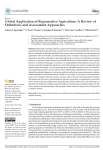Jayasinghe S.L., Thomas D.T., Anderson J.P., Chen C., Macdonald B.C.T. (2023). Global application of regenerative agriculture: a review of definitions and assessment approaches. Sustainability, 02/11/2023, vol. 15, n. 22, p. 15941.
https://doi.org/10.3390/su152215941
https://doi.org/10.3390/su152215941
| Titre : | Global application of regenerative agriculture: a review of definitions and assessment approaches (2023) |
| Auteurs : | S.L. Jayasinghe ; D.T. Thomas ; J.P. Anderson ; C. Chen ; B.C.T. Macdonald |
| Type de document : | Article |
| Dans : | Sustainability (vol. 15, n. 22, November 2023) |
| Article en page(s) : | p. 15941 |
| Langues : | Anglais |
| Langues du résumé : | Anglais |
| Catégories : |
Catégories principales 06 - AGRICULTURE. FORÊTS. PÊCHES ; 6.4 - Production Agricole. Système de ProductionThésaurus IAMM AGRICULTURE ; REGENERATION ; SYSTEME DE PRODUCTION ; CONCEPT |
| Mots-clés: | AGRICULTURE REGENERATRICE |
| Résumé : | Regenerative agriculture (RA) is an approach to farming pursued globally for sustaining agricultural production and improving ecosystem services and environmental benefits. However, the lack of a standardized definition and limited bioeconomic assessments hinder the understanding and application of RA more broadly. An initial systematic review revealed a wide range of definitions for regenerative agriculture, although it is generally understood as a framework consisting of principles, practices, or outcomes aimed at improving soil health, biodiversity, climate resilience, and ecosystem function. To address existing gaps, we propose a working definition that integrates socioeconomic outcomes and acknowledges the significance of local knowledge and context to complement established scientific knowledge. A second systematic review identified indicators, tools, and models for assessing biophysical and economic aspects of RA. Additionally, a third literature review aimed to identify the potential integration of advanced analytical methods into future assessments, including artificial intelligence and machine learning. Finally, as a case study, we developed a conceptual framework for the evaluation of the bioeconomic outcomes of RA in the mixed farming setting in Australia. This framework advocates a transdisciplinary approach, promoting a comprehensive assessment of RA outcomes through collaboration, integrated data, holistic frameworks, and stakeholder engagement. By defining, evaluating assessment methods, and proposing a pragmatic framework, this review advances the understanding of RA and guides future research to assess the fit of RA practices to defined contexts. |
| Cote : | En ligne |
| URL / DOI : | https://doi.org/10.3390/su152215941 |







